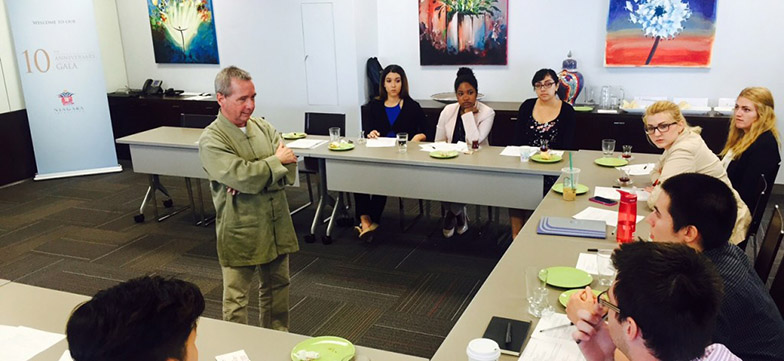By Jasmin Rojo, Brianna Deigan, and Alyssa Slager, Communications Interns
Niagara Foundation was happy to host Reverend Tom Lane for a Friends in Faith discussion about Buddhism in the United States on Tuesday, June 9th. Lane is currently the President of the Buddhist Council of the Midwest and is involved with the Buddhist Temple of Chicago. He began his process into the Buddhist faith while traveling in Nepal and is ordained into the Chan school of Buddhism, which is a version of Zen Buddhism. He has obtained five degrees in different social sciences and taught the English language in China for over eight years.
He began by sharing with us his religious practice of meditation, where he allowed us to focus on our breathing and find our inner peace. Afterwards, he began to discuss with us his knowledge of Buddhism including the Four Noble Truths, the Eightfold Pathway, which are the major components of Buddhism. The Four Noble Truths discuss the suffering and temptations that are experienced throughout life, and how we can overcome them by engaging in the Eightfold Pathway. Lane described the Eightfold Pathway as an eight spoked wheel, where all of its elements are interconnected and, if incorporated in daily life, can lead to individual enlightenment. The key aspects of the Eightfold Pathway include educating oneself and others, avoiding wrongdoing, purifying one’s mind, and recognizing constant impermanence throughout life.
After briefly describing the history of Buddhism, Lane then discussed the emergence of Buddhism in America. The two most common strands incorporated into Western Buddhism include Theravada, which concentrates on monks who practice Buddhism over the course of many lifetimes, and Mahayana, which believes in multiple Buddhas and highlights reaching enlightenment through meditation. Lane described characteristics of American Buddhism that are rooted in, but differ from, traditional Buddhism. Modern examples include informal dress, practices of yoga and bodywork as well as New Age tools, a worship structure similar to Protestant liturgy, and the importance of lay leadership (members who have been elected by the congregation to lead).
Following his discussion, he held a brief question and answer session. The questions includes the Buddhist practice regarding funerals, further description of the Buddhist idea of self and impermanence, Buddhist teachings regarding police and the military, and involvement of Buddhist communities in humanitarian relief and poverty alleviation. Lane concluded the discussion by mentioning that Buddhism has a history of peace, there are still issues with which it struggles (such as the role of the military) and “skeletons in its closet” such as the actions of the Burmese military junta. He hopes that the embracing of Buddhism by the West will create solutions to these matters and also encourage Buddhist communities to engage in more relief actions worldwide.
Here at Niagara Foundation, we would like to thank Rev. Tom Lane for his enriching perspective. His warm smile and positive demeanor was inspiring to all.

